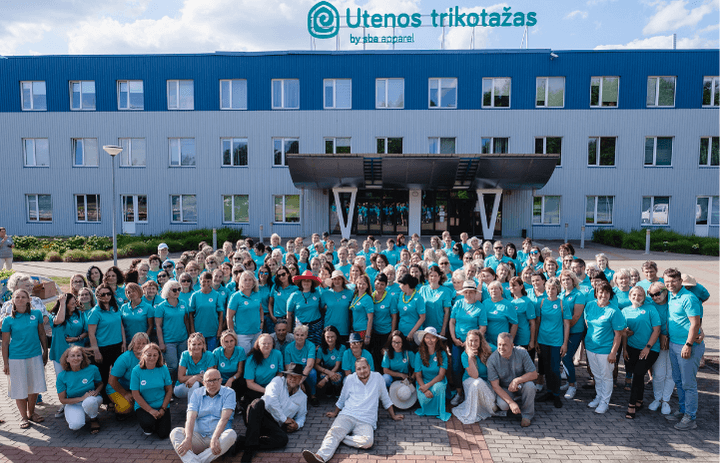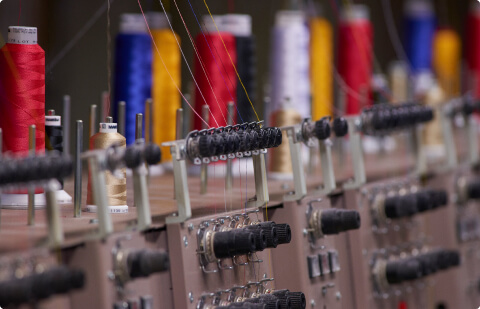2021
Utenos Trikotažas updated its visual identity and introduced a new corporate brand.
2020
The global environmental organization Greenpeace has recognized SBA Group company Utenos trikotažas as the first and so far the only textile company in the world to work entirely according to its textiles procurement standard.
The About brand by Utenos Trikotažas introduced a new line of clothing made from industrial textile leftovers. Innovative apparel manufacturer is seeking to further reduce the environmental impact of their operations and call on the public to pay attention to the origin and sustainability of their clothing.
The About brand by Utenos Trikotažas introduced a new line of clothing made from industrial textile leftovers. Innovative apparel manufacturer is seeking to further reduce the environmental impact of their operations and call on the public to pay attention to the origin and sustainability of their clothing.
2019
Utenos Trikotažas has been named ‘National Winner’ in the 2019 European Business Awards, one of the world’s largest business competitions.
2017
Utenos Trikotažas became the first company in Lithuania to officially join the Detox campaign by Greenpeace. The company commits itself to eliminate any raw materials likely to have adverse effects on humans or the environment from all stages of the production cycle, from the start through packing, to wearing, washing, sorting and recycling of clothing, by 2020.
The company celebrates its 50th anniversary.
The company celebrates its 50th anniversary.
2016
Utenos Trikotažas has upgraded its factory and retail brands. From now on, the products of the company will be branded with a shorter name UTENOS. The production line of the factory was complemented by an innovative digital printing machine.
2012
A production brand ABOUT of the Utenos Trikotažas is registered. Since 2012 on the company produces and develops two retail brands: UTENOS and ABOUT.
2009
Utenos Trikotažas is issued a production certificate OE100 (Organic Exchange 100).
2006
Utenos Trikotažas becomes the first Lithuanian company to be accredited with Social Accountability Standard SA8000.
2005
Utenos Trikotažas is rewarded the European Union Ecolabel Flower.
2001
Utenos Trikotažas was accredited with the Environmental Management Certification ISO 14001.
2000
Utenos Trikotažas was accredited with the Environmental Management Certification ISO14000. The company changed its logo.
1999
Utenos Trikotažas was included in the Baltic List on the stock market, containing companies from Lithuania, Latvia and Estonia. In December, the company was accredited BS EN ISO 9001:1994 Certification after the evaluation by the British Standards Institution (BSI). This evaluation confirmed that the company has chosen the right quality management system, which became fundamental in further pursuit of success.
Men's underwear collection Rokas was acknowledged as the best product of 1999.
Men's underwear collection Rokas was acknowledged as the best product of 1999.
1998
Ministry of Economy of the Republic of Lithuania and the Quality Council awarded Utenos Trikotažas with the National Prize for Quality, a prize pursued by many of large Lithuanian companies. The company was awarded the National Prize for Quality once again in 2003.
1994
Utenos Trikotažas became a part of SBA Group.
1993
Utenos Trikotažas was privatized.
1990
Once the independence of Lithuania was reinstated, Utenos Trikotažas reclaimed its title, became an independent company and entered a new stage.
1989
The factory was producing up to 19.4 mln. units of jersey products. 30% of the production was sold in Lithuania and the remaining 70% distributed in the Soviet Union. At that time the company had 3 thousand employees.
1986
Factory had 3152 employees, it's production volume vas over 18 mln. units of jersey products. The company was activelly invested in the issues of sports, cultural life, job security and improvement of working conditions.
1975
The company had it's name changed several times. Initially the name was switched to Utena Production Association for Jersey and Haberdashery. The same year it was replaced with Utena Marytė Melnikaitė Production Association for Jersey and Haberdashery. The former joined the companies of Utenos Trikotažas and Zarasų galanterija.
1967
Utenos Trikotažas factory started operating. At that time it was amongst the factories of the highest capacity among the Baltic countries: it had 518 employees and would produce up to 841 thousand of units of products per year.


